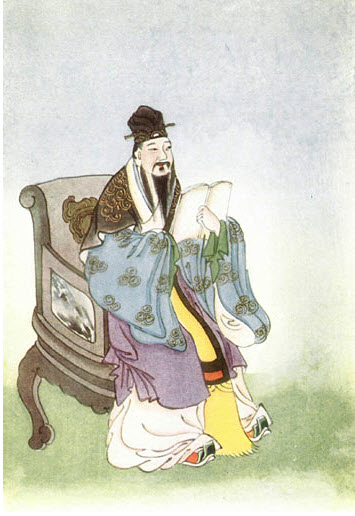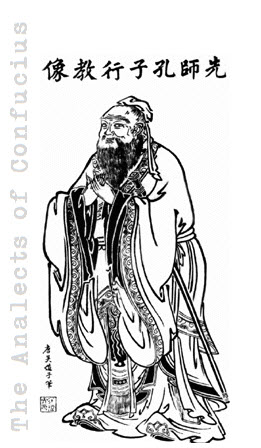Find the complete text of the Analects of Confucius.

BOOK X
Confucius in Private and Official Life
In his own village, Confucius presented a somewhat plain and simple appearance, and looked unlike a man who possessed ability of speech.
But in the ancestral temple, and at Court, he spoke with the fluency and accuracy of a debater, but ever guardedly.
At Court, conversing with the lower order of great officials, he spoke somewhat firmly and directly; with those of the higher order his tone was somewhat more affable.
When the prince was present he was constrainedly reverent in his movements, and showed a proper degree of grave dignity in demeanor.
Whenever the prince summoned him to act as usher to the Court, his look would change somewhat, and he would make as though he were turning round to do obeisance.
He would salute those among whom he took up his position, using the right hand or the left, and holding the skirts of his robe in proper position before and behind. He would make his approaches with quick step, and with elbows evenly bent outwards.
When the visitor withdrew, he would not fail to report the execution of his commands, with the words, "The visitor no longer looks back."
When he entered the palace gate, it was with the body somewhat bent forward, almost as though he could not be admitted. When he stood still, this would never happen in the middle of the gateway; nor when moving about would he ever tread on the threshold. When passing the throne, his look would change somewhat, he would turn aside and make a sort of obeisance, and the words he spoke seemed as though he were deficient in utterance.
On going up the steps to the audience chamber, he would gather up with both hands the ends of his robe, and walk with his body bent somewhat forward, holding back his breath like one in whom respiration has ceased. On coming out, after descending one step his countenance would relax and assume an appearance of satisfaction. Arrived at the bottom, he would go forward with quick step, his elbows evenly bent outwards, back to his position, constrainedly reverent in every movement.
When holding the sceptre in his hand, his body would be somewhat bent forward, as if he were not equal to carrying it; wielding it now higher, as in a salutation, now lower, as in the presentation of a gift; his look would also be changed and appear awestruck; and his gait would seem retarded, as if he were obeying some restraining hand behind.
When he presented the gifts of ceremony, he would assume a placid expression of countenance. At the private interview he would be cordial and affable.
The good man would use no purple or violet colors for the facings of his dress. [22] Nor would he have red or orange color for his undress. [23] For the hot season he wore a singlet, of either coarse or fine texture, but would also feel bound to have an outer garment covering it. For his black robe he had lamb's wool; for his white one, fawn's fur; and for his yellow one, fox fur. His furred undress robe was longer, but the right sleeve was shortened. He would needs have his sleeping-dress one and a half times his own length. For ordinary home wear he used thick substantial fox or badger furs. When he left off mourning, he would wear all his girdle trinkets. His kirtle in front, when it was not needed for full cover, he must needs have cut down. He would never wear his (black) lamb's-wool, or a dark-colored cap, when he went on visits of condolence to mourners. [24] On the first day of the new moon, he must have on his Court dress and to Court. When observing his fasts, he made a point of having bright, shiny garments, made of linen. He must also at such times vary his food, and move his seat to another part of his dwelling-room.
As to his food, he never tired of rice so long as it was clean and pure, nor of hashed meats when finely minced. Rice spoiled by damp, and sour, he would not touch, nor tainted fish, nor bad meat, nor aught of a bad color or smell, nor aught overdone in cooking, nor aught out of season. Neither would he eat anything that was not properly cut, or that lacked its proper seasonings. Although there might be an abundance of meat before him, he would not allow a preponderance of it to rob the rice of its beneficial effect in nutrition. Only in the matter of wine did he set himself no limit, yet he never drank so much as to confuse himself. Tradesmen's wines, and dried meats from the market, he would not touch. Ginger he would never have removed from the table during a meal. He was not a great eater. Meat from the sacrifices at the prince's temple he would never put aside till the following day. The meat of his own offerings he would never give out after three days' keeping, for after that time none were to eat it.
At his meals he would not enter into discussions; and when reposing (afterwards) he would not utter a word.
Even should his meal consist only of coarse rice and vegetable broth or melons, he would make an offering, and never fail to do so religiously.
He would never sit on a mat that was not straight.
After a feast among his villagers, he would wait before going away until the old men had left.
When the village people were exorcising the pests, he would put on his
Court robes and stand on the steps of his hall to receive them.
When he was sending a message of inquiry to a person in another State, he would bow twice on seeing the messenger off.
Ki K'ang once sent him a present of some medicine. He bowed, and received it; but remarked, "Until I am quite sure of its properties I must not venture to taste it."
Once when the stabling was destroyed by fire, he withdrew from the Court, and asked, "Is any person injured? "—without inquiring as to the horses.
Whenever the prince sent him a present of food, he was particular to set his mat in proper order, and would be the first one to taste it. If the prince's present was one of raw meat, he must needs have it cooked, and make an oblation of it. If the gift were a live animal, he would be sure to keep it and care for it.
When he was in waiting, and at a meal with the prince, the prince would make the offering,[25] and he (the Master) was the pregustator.
When unwell, and the prince came to see him, he would arrange his position so that his head inclined towards the east, would put over him his Court robes, and draw his girdle across them.
When summoned by order of the prince, he would start off without waiting for his horses to be put to.
On his entry into the Grand Temple, he inquired about everything connected with its usages.
If a friend died, and there were no near relatives to take him to, he would say, "Let him be buried from my house."
For a friend's gift—unless it consisted of meat that had been offered in sacrifice—he would not bow, even if it were a carriage and horses.
In repose he did not lie like one dead. In his home life he was not formal in his manner.
Whenever he met with a person in mourning, even though it were a familiar acquaintance, he would be certain to change his manner; and when he met with any one in full-dress cap, or with any blind person, he would also unfailingly put on a different look, even though he were himself in undress at the time.
In saluting any person wearing mourning he would bow forwards towards the front bar of his carriage; in the same manner he would also salute the bearer of a census-register.
When a sumptuous banquet was spread before him, a different expression would be sure to appear in his features, and he would rise up from his seat.
At a sudden thunder-clap, or when the wind grew furious, his look would also invariably be changed.
On getting into his car, he would never fail (first) to stand up erect, holding on by the strap. When in the car, he would never look about, nor speak hastily, nor bring one hand to the other.
"Let one but make a movement in his face,
And the bird will rise and seek some safer place."
Apropos of this, he said, "Here is a hen-pheasant from Shan Liang—and in season! and in season!" After Tsz-lu had got it prepared, he smelt it thrice, and then rose up from his seat.
[Footnote 22: Because, it is said, such colors were adopted in fasting and mourning.]
[Footnote 23: Because they did not belong to the five correct colors (viz. green, yellow, carnation, white, and black), and were affected more by females.]
[Footnote 24: Since white was, as it is still, the mourning color.]
[Footnote 25: The act of "grace," before eating.]
|
|
